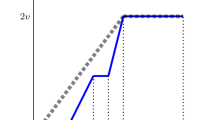Abstract
We examine the incentives of an interest group to provide verifiable policy-relevant information to a political decision-maker and to exert political pressure on her. In our view information provision is a risky attempt to affect the politician’s beliefs about the desirability of the lobby’s objective. The circumstances under which political pressure can be applied specify the lobby’s valuation of different beliefs of the politician and, thus, her attitude toward risk. We identify several factors that induce risk proclivity (and thus information provision), which allows to explain the stylized fact that lobbies engage both in information provision and political pressure. Moreover, our approach gives a novel explanation for the fact that interest groups often try to provide information credibly. We finally study the extent to which this preference for credibility is robust and identify some instances in which lobbies may prefer to strategically withhold information.
Similar content being viewed by others
References
Aghion P, Tirole J (1997) Formal and real authority in organizations. J Polit Econ 105:1–29
Annenberg Public Policy Center (2005) Legislative Issue Advertising in the 108th Congress. University of Pennsylvania, available at http://www.annenbergpublicpolicycenter.org/issueads05/Source20Files/APPCIssueAds108thMM.pdf
Austen-Smith D (1995) Campaign contributions and access. Am Polit Sci Rev 89:566–81
Austen-Smith D (1997) Interest groups: money, information, and influence. In: Perspectives on public choice. a handbook. Mueller DC (ed) Cambridge University Press, Cambridge 296–320
Austen-Smith D (1998) Allocating access for information and contributions. J Law Econ Organ 14(2): 277–303
Austen-Smith D, Wright JR (1992) Competitive lobbying for a legislator’s vote. Soc Choice Welfare 9: 229–257
Baker S, Mezzetti C (2005) Disclosure as a strategy in the patent race. J Law Econ 48:173–194
Baye MR, Dan K, de Vries CG (1993) Rigging the lobbying process: an application of the all-pay auction. Am Econ Rev 83(1):289–294
Bennedsen M, Feldmann S (2006) Informational lobbying and political contributions. J Public Econ 90(4):631–656
Bennedsen M, Feldmann S (2002) Lobbying legislatures. J Polit Econ 110(4):919–946
Berry JM (1997) The interest group society. 3rd ed. Longman, New York
Bulow JI, Geanakolos JD, Klemperer PD (1985) Multimarket oligopoly: strategic substitutes and complements. J Polit Econ 93(3):488–511
Cannon CP et al (2004) Intensive versus moderate lipid lowering with statins after acute coronary syndromes. N Engl J Med 350(15):1495–1504
Carpenter DP (2004) The political economy of FDA drug review: processing, politics, and lessons for policy. Health Affairs 23(1):52–63
Che Y-K, Gale IL (1998) Caps on political lobbying. Am Econ Rev 88(3):643–651
Crawford V, Sobel J (1982) Strategic information transmission. Econometrica 50:105–133
Dahm M, Porteiro N (2006) Side-effects of campaign finance reform. Working Papers Econ 06.15, Universidad Pablo de Olavide
EFPIA (2005) Joint position on the disclosure of clinical trial information via clinical trial registries and databases. January, available at http://www.efpia.org/4pos/sciregu/Clinicaltrials2005.pdf
Grossmann GM, Helpman E (2001) Special interest politics. The MIT Press, Cambridge
ICMJE (2004) Clinical trial registration: a statement from the International Committee of Medical Journal Editors. N Engl J Med 351(12). Available at http://www.icmje.org/clintrial.pdf
Laffont J-J (1999) Political economy, information and incentives. Presidential Address. Eur Econ Rev 43:649–669
Laffont J-J, Tirole J (1993) A theory of incentives in procurement and regulation. The MIT Press, Cambridge
Lohmann S (1995a) Information, access, and contributions: a signaling model of lobbying. Public Choice 85(3–4):267–84
Lohmann S (1995b) A signaling model of competitive political pressures. Econ Polit 5:181–206
Matějka M, Sander O, de Waegenaere A (2002) The effectiveness of caps on political lobbying. CentER Discussion Paper No. 2002–44, Tilburg University
Meadows M (2002) The FDA’s drug review process: Ensuring drugs are safe and effective. FDA Consumer magazine. July-August, available at http://www.fda.gov/fdac/features/2002/402drug.html
Milgrom P (1981) Good news and bad news: representation theorems and applications. Bell J Econ 12: 380–391
Shin HS (2003) Disclosures and asset returns. Econometrica 71(1):105–133
Schlozman KL, Tierney JT (1986) Organized interests and American Democracy. New York: Harper and Row
Sloof R, van Winden F (2000) Show them your teeth first! a game-theoretic analysis of lobbying and pressure. Public Choice 104:81–120
Snyder JM Jr (1991) On buying legislatures. Econ Polit 2(3):93–109
Stigler GJ (1971) The theory of economic regulation. Bell J Econ 2(1):3–21
Tullock G (1980) Efficient rent seeking. In: Toward a theory of the rentseeking society. Buchanan J, Tollison R, Tullock G (eds), A&M University Press, College Station pp 97–112
Wright JR (1996) Interest groups and congress: lobbying, contributions, and Influence. Allyn & Bacon, Boston
Yu Z (2005) Environmental protection: a theory of direct and indirect competition for influence. Rev Econ Stud 72:269–286
Author information
Authors and Affiliations
Corresponding author
Additional information
We wish to thank David Austen-Smith, Steven Callander, Daniel Diermeier, Sven Feldmann, Paula González, Jean Hindriks, Johannes Hörner, Rafael Hortala-Vallve, Jaehoon Kim, Christoph Kuzmics, Inés Macho-Stadler, Antonio Nicolo, Ignacio Ortuño-Ortín, David Pérez-Castrillo, Anaís Tarragó, Fernando Vega-Redondo and Michael Wallerstein for helpful comments. The comments of an anonymous referee substantially improved the manuscript. The usual disclaimer applies. This work has been partially carried out while the first author was visiting Northwestern University (Kellogg School of Management, MEDS, CMS-EMS). The hospitality of this institution and the financial support of the Spanish Secretaría de Estado de Educación y Universidades with co-funding by the European Social Fond is gratefully acknowledged. This work is also partially supported by the Departament d’Universitats, Recerca i Societat de la Informació (Generalitat de Catalunya), project 2005SGR00949.
Rights and permissions
About this article
Cite this article
Dahm, M., Porteiro, N. Informational lobbying under the shadow of political pressure. Soc Choice Welfare 30, 531–559 (2008). https://doi.org/10.1007/s00355-007-0264-x
Received:
Accepted:
Published:
Issue Date:
DOI: https://doi.org/10.1007/s00355-007-0264-x




